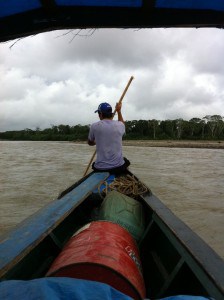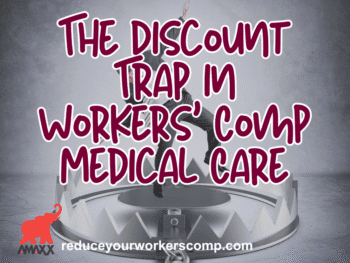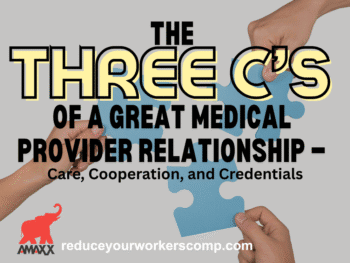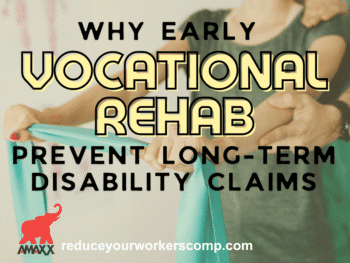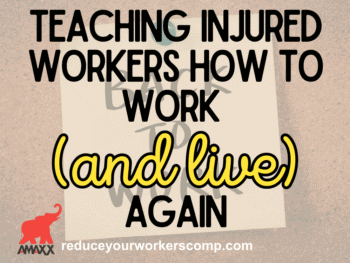When the San Diego Zoological Society was chosen by the Peruvian government to manage its research station in the Amazon jungle — the trackless Manu National Park — it had the responsibility of providing emergency medical care to its staff.
The hazards: poisonous snakes and crocodiles, malaria and yellow fever, parasites and fungus, as well as normal strains, sprains and lacerations.
Helicopter evacuation? Forget it. The dense jungle canopy, long distance and bad weather in the rainy season make it next to impossible – even if the nearest helicopters weren’t on the other side of a mountain range.
Click Link to Access Free PDF Download
“The 6-Step Process To Determine Workers’ Comp Injury Causation”
So, the zoological society hired Medcor, an on-site medical firm based in Illinois, to help establish a wilderness medical program to manage a research station in the jungle, at Cocha Chashu in the Amazon jungle of Peru. The zoo contracted with the Peruvian government to help manage the site. Since the zoo has worked with Medcor for years in San Diego, they already had experience working together and had proved the effectiveness of this kind of risk management in other projects.
June 8, Medcor founder and CEO, Philip Seeger, and EVP Curtis Smith traveled to the jungle with the zoo’s risk manager, David Matthias, to conduct a first-hand assessment of all the travel and evacuation logistics. Medcor needed to assess the medical needs and response options for people at the station that is so remote it requires four days travel from the United States each way, the last two by small boats, 10 hours a day.
This means the 20-year-old Cocha Chashu station, according to Medcor executive vice president, Curtis Smith, is two days to the nearest town. So telemedicine is essential, particularly when the science group is too small for an onsite medical professional. Research groups vary from two people up to 30, staying from days to months.
While navigating the rivers, they test two different satellite systems to connect to Medcor’s existing triage call center. Medcor’s telemedicine service is already used by over 80,000 worksites (and many mobile workers) in the US and is available 24/7. Connecting from the jungle involves data, audio and video links – all of it battery and solar powered.
Shortly after arriving at the station, the Medcor team had opportunity to use their triage service on a real patient. The first on-site injury? An insect bite (presumed to be a spider) that was becoming inflamed. Treatment was given immediately and the patient recovered without complication, Smith said.
Medcor is also working with locals who provided travel and support services for the station. The project includes stocking the station with essential medical supplies; protecting them from insects, heat and humidity is key to having them available when needed. Supplies in place could be used by researchers being directed by Medcor clinicians remotely, or used by Medcor staff who travel on-site to support large groups.
Wilderness medicine is not new for the company, which supports a clinic at the base camp of Mount Everest, provides on-site medical services at Yellowstone National Park, and has ranged far afield with services on Pacific islands, as well as remote areas in the US. “Of course wilderness medicine is specialized,” says CEO Philip Seeger, “but there are many similarities to our core on-site services in the US, too, Most of the injuries we deal with are still sprains and strains, and we have to train and support our staff, get reports to our clients on time, and stay in compliance with HIPAA and other regulations. Delivering our services remotely forces us to become more efficient overall – many of those improvements also benefit our patients and clients using our services here is the US.”
Author Rebecca Shafer, JD, President of Amaxx Risks Solutions, Inc. is a national expert in the field of workers compensation. She is a writer, speaker, and website publisher. Her expertise is working with employers to reduce workers compensation costs, and her clients include airlines, healthcare, printing, publishing, pharmaceuticals, retail, hospitality, and manufacturing. See www.LowerWC.com for more information. Contact: RShafer@ReduceYourWorkersComp.com.
Our WC Book: http://www.wcmanual.com
WORK COMP CALCULATOR: http://www.LowerWC.com/calculator.php
MODIFIED DUTY CALCULATOR: http://www.LowerWC.com/transitional-duty-cost-calculator.php
WC GROUP: http://www.linkedin.com/groups?homeNewMember=&gid=1922050/
SUBSCRIBE: Workers Comp Resource Center Newsletter
Do not use this information without independent verification. All state laws vary. You should consult with your insurance broker or agent about workers comp issues.
©2011 Amaxx Risk Solutions, Inc. All rights reserved under International Copyright Law. If you would like permission to reprint this material, contact Info@ReduceYourWorkersComp.com.

